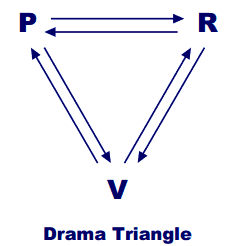How Are Games Played?
Stephen Karpman (1968) designed a model to explain three dynamics of social interactions; it is from these three roles that games are played within relationships.
The three positions are Persecutor (P), Victim (V) and Rescuer (R). The theory suggests that each individual has 2 preferred roles and will seek individuals that will compliment them by having complimentary positions i.e. for someone who likes (subconsciously) to play the rescuer; someone who plays the victim is their ideal person for complimentary interactions.
The position on the triangle is not where the game lies, it’s when individuals switch their role, that feelings change and a negative payoff is achieved – this is the game. Have you ever experienced a similar kind of situation to this:
‘Jane is having some car problems, her friend Clare is aware that Jane is on a good bus route and though she hasn’t asked her, Jane would probably be willing to get the bus to and from work; regardless, Clare offers to give her lifts, even though it is out of her way (rescuing). Jane is delighted and takes up Clare’s offer for the lifts (accepting the victim role) and within 3 days, her car is back on the road. A small while later, Clare’s wanting to go out with friends straight from work and so doesn’t want to take her car in today, she remembers giving Jane a life to work when she didn’t have a car and so asked her if she would return the favour; Jane’s reply is that she can’t do that today. If Clare has the process where she thinks that Jane is ungrateful for what she did for her, if Clare feels resentment for putting herself out when Jane’s evidently not willing to do it once for her, then she switches from the rescuer role into persecutor and thus shifting Jane into victim when she confronts Jane and Jane finds herself trying to justify herself.’
How could this have been avoided?
The game started when Clare offered to take Jane to work; this is because she totally discounted Jane’s ability to solve the problem herself, she didn’t ask if Jane needed help and Jane didn’t ask for it. The negative payoff for Clare was when her feelings of being important to Jane, useful and wanted, turned into feeling unimportant and unappreciated, something that Clare is likely to be familiar with and would be why Clare developed her preferred role as rescuer; in an attempt to avoid feeling unimportant though the game always ends up the same.
Brief Overview of Roles:
Rescuer: the rescuer discounts their own needs in the moment, applying short term problem solving to others’ needs; always working hard to ‘help’ others and doing so to move away from their own anxieties and fears. Rescuers attract victims.
Persecutor: the persecutor blames and criticises without offering guidance or help to the underlying issue. They find fault and are critical, often feeling insecure and inadequate themselves. Persecutors find victims.
Victim: The victim denies responsibility for their situation and more so, their power to change it. They appear very sensitive and are reluctant to make a stand. Victims attract rescuers.
If you are familiar with this concept, because it is apparent in your life; you could benefit from gaining self-awareness to facilitate your ability to change it.
Keep tuned in for a separate blog on each role and how to step out of the drama.

